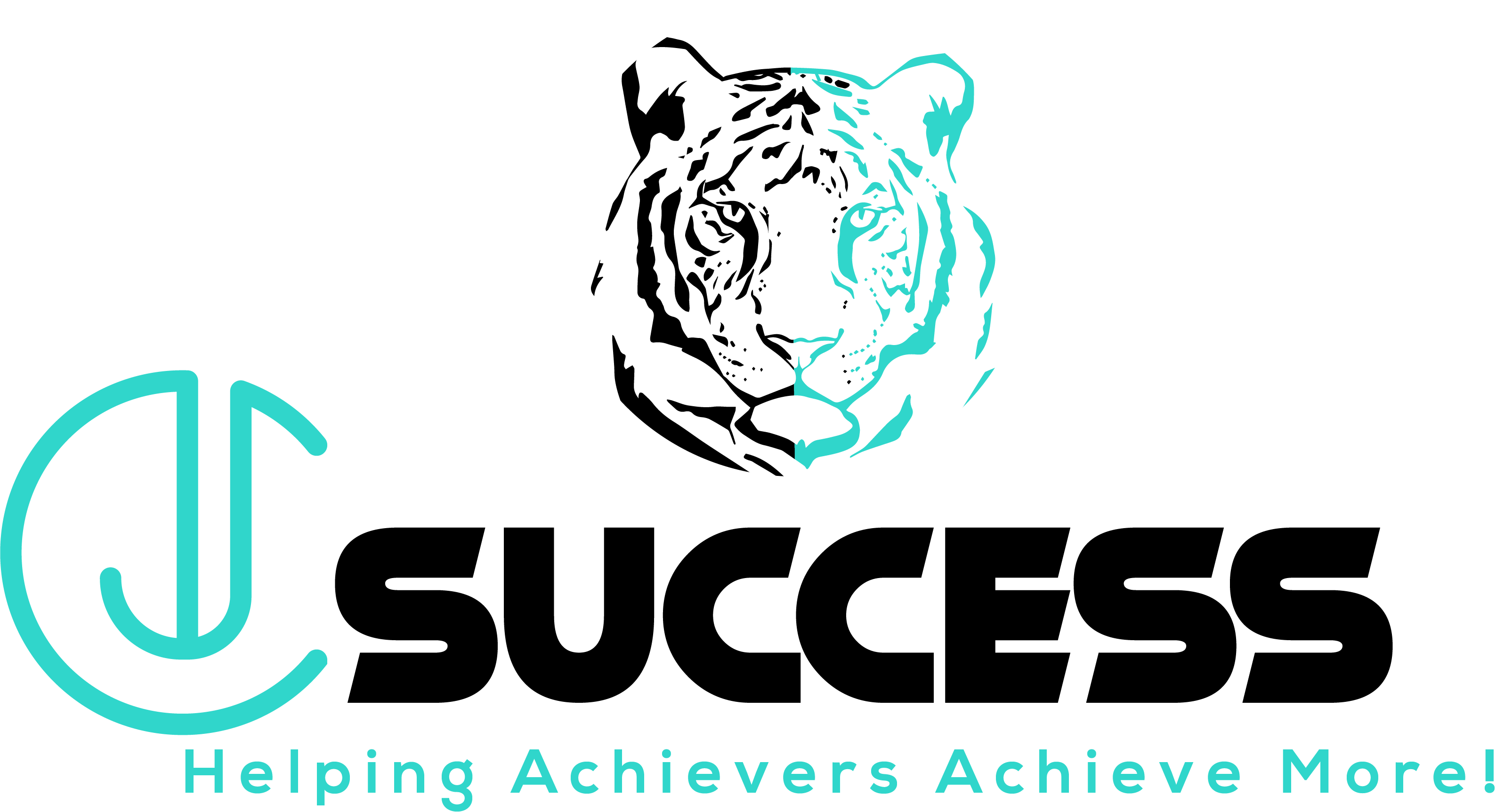0
+
Add your comment
UPCOMING EVENTS
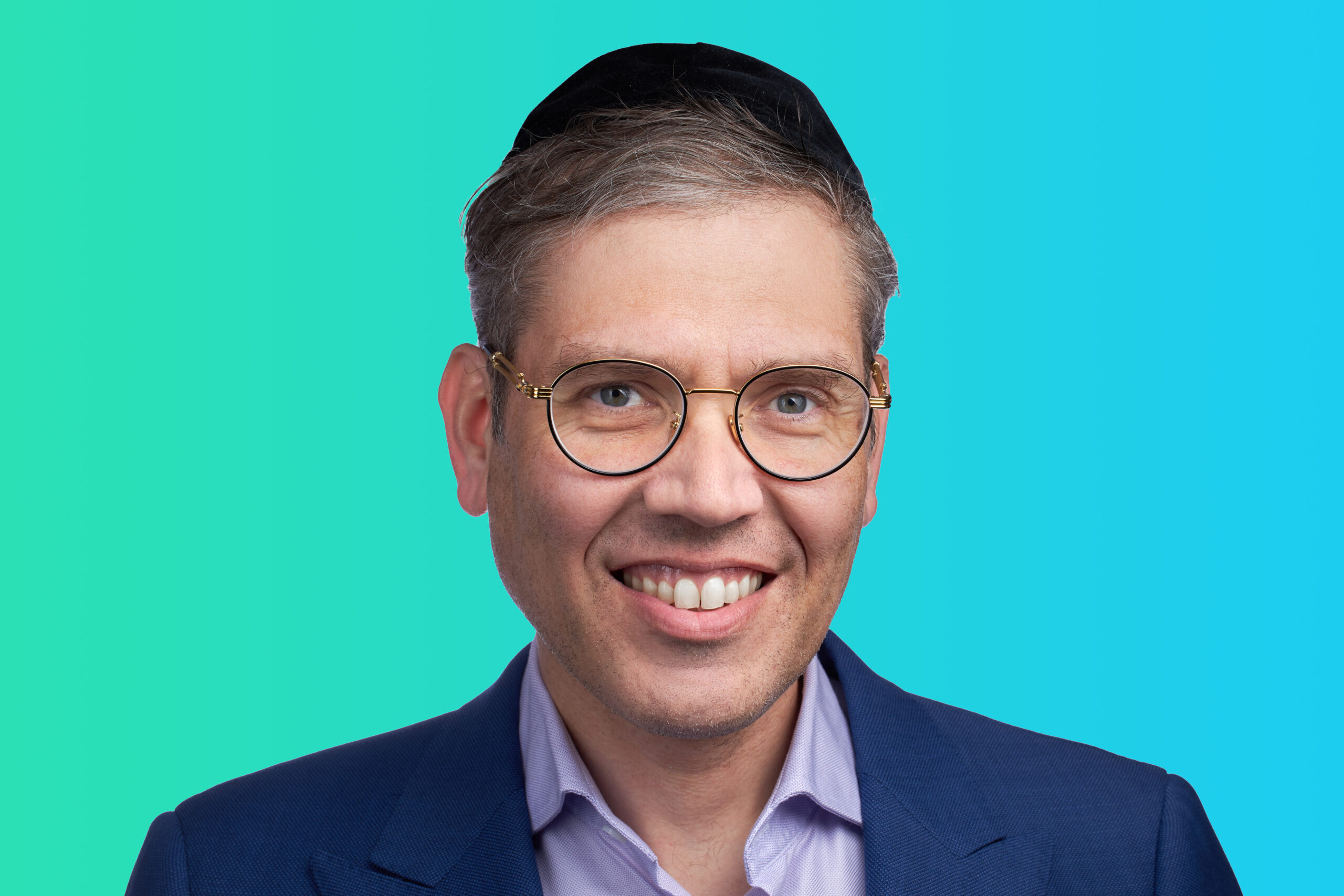
Interview with Ira Zlotowitz
Ira Zlotowitz
August 31, 2023
by Ira Zlotowitz - Founder & CEO, GPARENCY
Dear JSuccess members,
This month we have the unique honor & privilege to interview Ira Zlotowitz, Founder & CEO of GPARENCY!
Ira is a Commercial Real Estate Finance revolutionary who has devoted his life and career to creating opportunities for people. The recently launched GPARENCY is no different. Being the youngest president of any Top 10 mortgage business, as well as the founder and driver of Eastern Union’s $5B in yearly loans, Ira has worked with 1,000s of GPs over the years. Read Ira’s extensive bio below!
What an honor to have the opportunity to spend half an hour interviewing one of the busiest and most accomplished CREF revolutionaries of our time! Ira’s is an inspiration to our global Jewish community of business leaders as to what one individual can accomplish!
As mentioned in our inaugural edition last month, this interview series is a bit different than the typical since it servers a unique purpose. As opposed to Ira’s success “outcome”, our purpose is to discuss his success “process” so that the rest of us can learn and apply some of his habits & disciplines to experience similar levels of success in our own professional and personal lives. Our focus is personal development rather than industry or business acumen.
So without further ado, let’s hit play and hear what Ira has to say!
Since my time with Ira was limited to 30 minutes, I decided to try out some cool AI tools to gather summaries from more than 40 articles authored by Ira either for Ami Magazine or on Ira’s own LinkedIn newsletter entitled, ’Better Than Yesterday’.
These articles are lengthy and offer a great view into Ira’s accomplishments, and to make it easy to consume I’ve brought you a one to two paragraph summary for each article, along with my personal takeaway.
Ira Zlotowitz - Article summaries:
- How My Father Built a Revolutionary Legacy in Business While Putting Family First.Rabbi Meir Zlotowitz was a marketing genius, a great businessman, and an even better father. At the end of his life, his proudest accomplishment was his family. He prioritized us no matter where he was or who he was with.
My takeaway: Wow, what a legacy! My grandmother used to tell us often, “Mein greste faremegen is mein mishpacha.” (my greatest possession is my family) And we felt it… - Getting Trained by the Best and Truly Becoming an Expert.
The best way to become a master at your craft is to learn from those who have gone before you. The most successful people say no to anything that doesn’t move them toward their ultimate vision. If you want to be the best, you have to get trained by the best.
My takeaway: Very insightful. I would venture to say that this was his father’s modus operandi as well. Everything ArtScroll Mesorah Publications touches is a MASTERPIECE due to the level-10 talent in every department! - The Sage Advice I Learned From the Wealthiest Businessmen of Our Time.
One of the wealthiest businessmen of our time taught me that when it comes to charitable giving, we must be totally machnia to our D’aas Torah to guide us. When someone comes to my organization and asks for help, it's an opportunity for me to put my money towards making a powerful impact on someone's life.
My takeaway:I like his choice of words, "We all have the opportunity to make an immense IMPACT on our communities and beyond". So it follows that by listening to our leaders when it comes to charitable giving, we end up making the greatest impact, seen from their vantage point, not ours. Very inspiring article! - Facing My Biggest Obstacle: Weight Loss and Paying It Forward.
Ira was 100 pounds overweight due to liking ice cream and potato chips more than salad and exercise. Sometimes, we need an outside perspective to push us in the right direction. When people are honest with you about what needs to be changed, face it, Ira says.
My takeaway:I love the way he comes out in public and shares this as a way to pay it forward! - The Great Secrets Nobody Mentions About Hiring Inexperienced People.
Mentorship can be key to learning the full potential of your business. Inexperienced hires can offer a new perspective and a different way of doing things. When I have a mentor, I gain even more. Never underestimate the power of someone just getting started in roles.
My takeaway: I never thought of it that way, and it takes lots of humility… - Our Values Saved Us From The Brink of Disaster.
Eastern Union was shut down after a client took advantage of a junior analyst. The bank had every right to shut the company down, but they didn't. The company learned lessons that helped it grow even stronger in the coming years.
My takeaway: Ira talks a lot about learning from mistakes, which turns failure into success. Another takeaway is the value of having strong values as a compass. - A Time to Expand; A Time to Contract.
In 2006, when the economy was in recession, Eastern Union was forced to cut costs. The company decided to contract instead of laying off employees. The decision was a good one for the company, which is now in a strong position.
My takeaway: I admire the courage to make these unpopular decisions, which I believe can only happen from lots of personal development. - You Can Never Care Too Much, But It’s How You Express It.
Leaders often tell me their greatest hurts, struggles and disappointments have come from conflicts with employees. "I would never let myself get to a point of frustration or take false responsibility for my team.”
My takeaway: It’s about having the right EQ in any given situation, and not getting too emotionally involved. Ira calls this “not mixing business with pleasure.” - The Risk of Success.
When Ira first started Eastern Union at the age of 25, people encouraged him to play it safe. Jeff Bezos refers to this mindset shift as the difference between a Day 1 company culture and a Day 2 company culture. By being willing to try new things and go against the grain, your business will become more valuable and grow in demand.
My takeaway: We can definitely learn something about courage and innovation. - It’s Only Failure If You Don’t Learn From It.
In his career, Giorgio Armani has failed more times than he wants to count. The key is recognizing and owning up to the failure and identifying what you can learn from it, he says. He says taking risks in business always means you might fail, but hedge the risks as much as possible.
My takeaway: I think this is one of the key ingredients separating the entrepreneurs from the non-entrepreneurs. - When Choosing Office Locations, Follow Your People.
Growth requires people. People are what make great ideas a reality. Instead of defining your people by your business, define your business by your people. Your team defines the type of clients you attract, the hires that want you, and the quality of your execution. If you build your team around rigid processes, you're going to end up with employees that aren’t invested in the future of your business.
My takeaway: Ira talks elsewhere about turning employees into partners. - How Quitting Your Job the Right Way Can Lead to New Opportunities.
When it comes to challenging decisions, I rely on the 10-10-10 rule. Ask yourself, "How are you going to feel about this in 10 seconds? 10 days? 10 months? 10 years?" If you take the right steps before putting in your notice, you can leave on good terms.
My takeaway: I like the short-term and long-term vision exercise. - If An Employee Can Go Alone, Imagine What You Could Do Together.
CNN's John Sutter takes on the idea of paying a company to train its employees. Sutter: "I’ve found that people who make a lot of money and are happy at their jobs don’t want to leave;" "If you’re in a competition mindset, you’ll only be setting your company up for high turnover and a low success," Sutter says.
My takeaway: Ira is a big fan of investing in employees and it’s a concept he keeps repeating. - How Delegation Can Grow Your Company Overnight.
In order to grow quickly, we committed to wholeheartedly embrace delegation. I’m not going to sugarcoat it: Delegating tasks can be a pain. But besides putting your trust in God it’s the best advice I can give. Delegate quickly and often.
My takeaway: This is an issue most visionaries struggle with and it’s refreshing that education is available to learn how to perfect the process—for those willing to admit they don’t have all the answers. - The Powerful Fundamentals of Strategic Partnerships.
In 2001, when I left my job as a partner in a company to start my own, I found myself with no one to bounce ideas off of. My partner, Abe Bergman, and I decided to work out an agreement to work together. It was one of the best decisions I've ever made.
My takeaway: This is an individual call for each person and each scenario. I would assume a good coach is called for.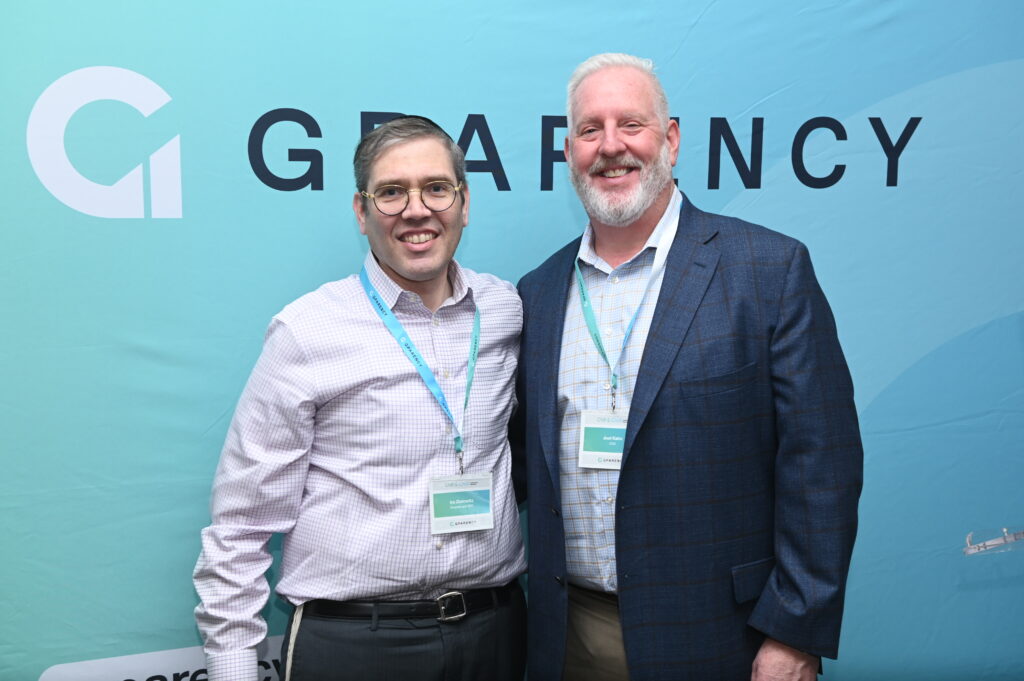
Ira with Joel Kahn, COO, GPARENCY
- Embracing New Ideas Despite the Challenges – Take the Bad With the Good.
The question is, is the idea worth the fight? All ideas, even good ones, have their share of naysayers and issues to work through in the beginning. "I can’t count the times we could have said, “Is this really worth it?” and thrown in the towel on telemarketing," he says. But good ideas are worth fighting for.
My takeaway: It’s part of the creative process to let the ideation go loose. - The Epiphany That Changed the Trajectory of My Entire Career.
When you're comfortable, that can be one of the hardest times to embrace growth in your life. It's not easy to leave your job, safety net, and everything you know behind to pursue something that has no guarantees. Don't leave “because of” the obstacles you’ve faced … do your best in spite of.
My takeaway: Ira really applies these three key words he learned in his youth (“in spite of”) to every area of life. - I Said No to My Boss and I Got a Raise.
Everything in life is either an investment or an expense, even when there isn't a clear monetary value attached. When you understand this, it’s much easier to make impactful decisions in your life. If I want to make $500,000 a year, then I need my value to far surpass that number.
My takeaway: This is such valuable advice! Money is an outgrowth of value provided. Provide lots of value and make lots of money. Simple. - I Almost Got Fired, What Happened Next Changed My Life.
In many cases, those are the turning points of your life that can lead you to your greatest successes. Evaluate the situation; if there is a solution, great—if not, then own up to it.
My takeaway: I think it was Gandhi who said, “In times of crises a leader emerges.” Great article! - Eliminating the Fear of No and Getting a Yes More Often.
This week, we focus on one of the most important superpowers of every good salesperson: listening. If you don’t have what they’re looking for, sometimes the best sale is not to make your ask at all and maintain their respect instead. Listening is about understanding your client, not being able to sell a sale.
My takeaway: It works so well with kids too! - These Three Words Differentiate the Most Successful People.
Ira’s chavrusa, as a newly-married man, Reb Meir—today a famous rav in Lakewood, New Jersey—explained how the power of “in spite of” could either be something that propels us forward in life or holds us back.
My takeaway: I find this concept very empowering, since everyone has their own version of “in spite of.” - I Got Rejected From Mesivta … Here’s Why I’m Thankful.
Rejection isn’t a reflection of you or a sign of personal failure. Sometimes you try to go to a place that’s not meant for you. Finding my passion in life took time, but the journey was worth it. In the term by EOS, they coined, they get it: get it, and have the capacity for it.
My takeaway: I think this mindset takes both humility and courage. It’s also great to hear Ira endorse EOS on a constant basis. - Finding Purpose in an Unlikely Place: The Launch of Masmid Govoha.
Ira founded the Masmid Govoha program nearly three decades ago to motivate upper elementary school boys to learn a few minutes each night. The same principles he learned to inspire kids at Camp Romimu would later help Ira incentivize mortgage brokers to do billions in deals.
My takeaway: It’s refreshing to learn how Ira found his calling, and how a concept can be implemented in so many different ways! - Everyone Fails – Here’s How to Avoid It.
The road to success is paved, most often, with the feedback of our failures. Set goals that scare you and let the fear of failure drive you to push harder. James Dyson created 5126 prototypes that failed over 15 years before making the best-selling vacuum cleaner.
My takeaway: What I’m hearing is that since we all need to deal with fear, instead of being scared of petty things, why not create really scary undertakings and be forced to deal with big stuff! - The Pros and Cons of Exclusivity: How to Get the Best of Both Worlds.
Exclusivity plays a big role in our careers, whether we realize it or not. In business, exclusivity simply means an allegiance formed to one person or vendor. With exclusivity, most people will only do the bare minimum, there’s no need to do their absolute best for you.
My takeaway: This is a new take on the concept that competition is the best thing for business, which I hadn't thought about. Great point! - How to Thrive in Your Career Even During Budget Cuts.
Budget cuts in an organization can mean a variety of changes for both the company and staff. It's not solely about your ability to do your job; it's also about the value you bring. If your boss is relying on you, you can be sure your name is not on the list when it comes time for layoffs.
My takeaway: Ira often talks about focusing on impact vs. profit, and when budget cuts hit, this is certainly one very important area of distinction! - Three Tips to Increase Your Cold Calls and Bring in More Leads.
Salesman: Make your cold calls first thing in the morning. If you have to make 100 calls in a day, that’s about 12 calls per hour. I used to turn my cold calling into a game and not stop until I hit my target for the day. If someone on the phone asked me to send more information, I would email them with the requested information once done before the end of the day.
My takeaway: Several great tips here. My favorite one was the ability to finish the task with no interruption. - How to Lend Money to a Friend (and Still Protect Your Relationship).
I ask them to turn a big financial hurdle into small digestible numbers. This is similar to how people view their mortgage payments—they may owe a large sum of money, but when you ask them about it, they’ll tell you what they owe monthly. By breaking down the smaller steps, it makes it easier to get people where they need to go.
My takeaway: Good read! It also illustrates some of the relationship issues the more successful among us need to learn how to master! - Why the 85/15 Rule Saves Meetings.
If we can all agree on 85% of a matter, we move on. We’ll table the other 15% and discuss it on a call scheduled specifically to iron out those details.
My takeaway: I love the concept of staying focused on the big picture! - What Should You Look For in a Business Coach?
Is coaching for everybody? Yes, without a doubt. However, resist the temptation to hire the first person you talk to. First take a second and read the five steps below:- 1. Don’t ask: If my coach is so good, why aren’t they doing it themselves?
- 2. Be honest. Are you really ready to tackle your issue?
- 3. Start by identifying your biggest business weakness.
- 4. Ensure that the coach’s niche aligns with your most significant pain point.
- 5. Set the length of your engagement.
My takeaway: Many great takeaways, including the fact that all successful leaders should have one, and he or she should be in perfect alignment.
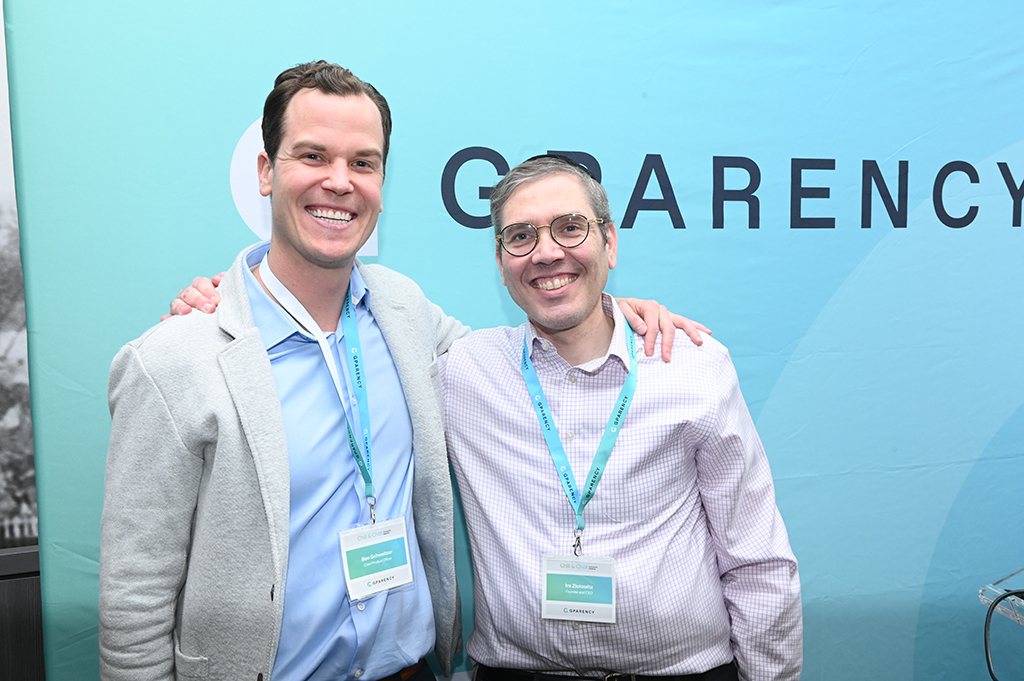
Ira with Ben Schweitzer, CPO, GPARENCY
- The Biggest Lesson I Learned From My Dad.
Rabbi Meir Zlotowitz was a marketing genius in the Jewish world, and he also knew the true secret to sales. He took the time to understand the situation before he ever made an ask. If a client has concerns you can’t address, it’s not worth the time, energy, or paperwork trying to convince them.My takeaway: Do your homework well to ensure the answer will be yes! - When Your Client Ghosts You: How to Get the Ghost to Speak.
If you want the ghost to speak, treat the client as a human with kindness and ask questions. Let them know you’re open to their feedback. You have nothing to lose. If there’s one thing humans like sharing, it’s their opinions!
My takeaway: Being genuine is the best strategy. - How to Keep a Client From Ghosting You.
Tiffani Bova is a sales expert and author of "Sales 101" Bova: "The client not getting back to you isn’t what killed the deal … how you responded did!" Give your prospect the benefit of the doubt and give them a graceful way out, she says.
My takeaway: Let’s remember that our prospects are human, and we should treat them accordingly! - What Role Should Inexperience Have on Your Team?
Hiring inexperienced people is not only a way to give back, but it can also have huge advantages. Some of the best people I've ever hired were also the ones who had no experience at all. The secret sauce is hiring both experts and new talent on the same team.
My takeaway: I find this approach very creative, as well as opportunistic. - Great Goals Require Great People—Here’s How to Find Them…
Hiring the wrong employees can be a costly mistake, so what characteristics do you need to look for to hire the right employees and bring out the best in your team? It all comes down to two things: Making sure the people you hire are well-balanced and that they pass the GWC test. Look for people who not only possess strengths in your weakest areas but are PASSIONATE about your weaknesses.
My takeaway: This takes lots of self-awareness as well as ‘other’ awareness. Great leadership stuff! - From Survivalist to Visionary: How to Overcome the Fear of Delegating…
Delegation is a skill you have to cultivate. It allows you to get more done in less time and give your employees an opportunity to grow. Make the vision plain. Stay in your lane and empower your team. Designate team members that will be accountable for their projects, and make sure your team is speaking the same language.
My takeaway: Once we learn how to master this skill, whatever we envision can be ours! - Delegation Doesn't Work Unless You Understand This…
Accountability is the foundation for everything—not to be confused with responsibility. I’m huge on accountability. The issue is, a lot of people don’t do accountability right. We need people on our teams who are willing to take on extreme accountability.
My takeaway: Putting qualified individuals in positions of accountability is the key to effective leadership and to accomplishing massive goals. - Three Keys to Leading and Protecting Your Business During a Recession…
With the economy in a state of decline, there's no question that people are going to be stressed and moving into a mode of caution. This is where true leadership skills come into play. Here are a few guiding principles. 1. When you exhibit confidence and transparency as a leader, your team will be able to succeed despite the hardships they may be facing. 2. Showing great leadership during times of economic crisis is not just about having a strong vision and making tough decisions, but also making sure that you're helping others around you do the same. 3. Make the financial shifts you need to early, and encourage your team to do the same.
My takeaway: It boils down to three words: confidence, vision and action. - Partner Away Your Weakness, Then Polish Your Strengths…
Are you more of a Visionary or an Integrator? In his new book, Entrepreneurial Ownership (EOS), John Sutter talks about the importance of partnering with the right people. Sutter: "If you’re responsible to come up with the vision, integrate it, and try to build up a team from scratch, you're going to have a lot of frustrations.”
My takeaway: I love the title more than anything because it reinforces that it would be a terrible strategy to try and polish our strengths while trying to compensate for our weaknesses. - To Grow, You Have to Address Your Biggest Issue…
I made a commitment to myself that no matter how much I wanted to help, or what mistakes were made, I would never let myself get that frustrated again.
My takeaway: Communication!
Based on over 40 articles by Ira, here is a picture of the words used most often throughout all conversations. Words that are used more often are bigger and those used less often are smaller!

Here are the top four words used by Ira in over 40 conversions! Do you see what I see? “People” is more frequently used than “business!”
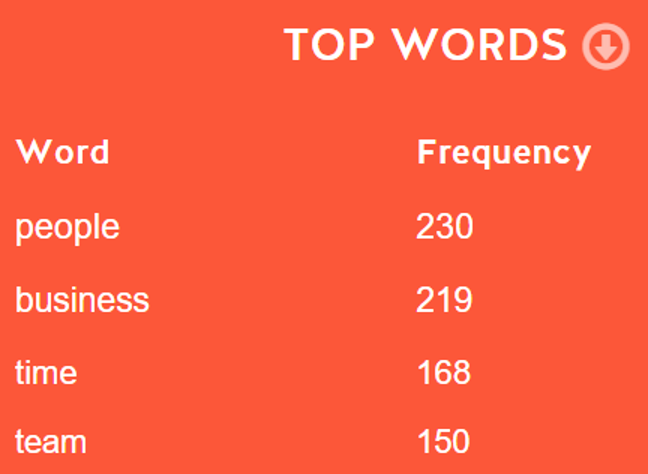
Amazing what some cutting-edge AI tools can generate, isn’t it?!
We’d love to hear from you!
If you have any thoughts, takeaways, questions, or comments, please share them with us and we’ll do what we can to have the expert address your message in next month’s edition! As an added bonus, if you’re a paid member, you can share your company name and your position, and the expert will include that when addressing your point!
